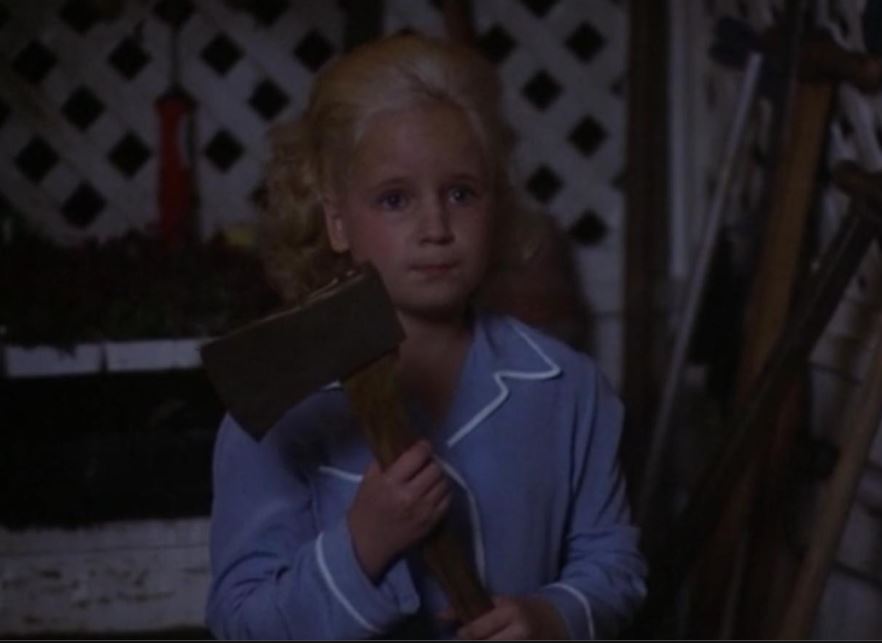
Cinema is littered with ridiculous turns, most of them delivered by Nic Cage. Talented as he is at scenery chewing (as anyone who’s seen Con Air or The Wicker Man remake will attest) I still don’t think his frequent hammy excesses can ever reach the level of Faye Dunaway in Mommie Dearest. This 1981 travesty will always get my vote for containing the most over the top performance of all time.
Building the hysteria from behind a pair of distinctively sculpted eyebrows, Dunaway embarrasses herself to such an extraordinary degree that I have to recommend at least one viewing of Mommie Dearest. She plays the Oscar-winning Hollywood actress Joan Crawford, although this choppy, unconvincing biopic is more concerned with her private life than career.
Unable to have kids, she gets her hands on a couple anyway, and in the process manages to make child abuse pretty damn funny. In particular, she treats her young daughter Christina to her full range of demented maternal tics. One moment she’s throwing her a lavish birthday party, the next she’s hacking her hair off. During a backyard swimming race Joan treats it ultra-seriously, telling the blonde poppet after her easy victory: “No one ever said life was fair, Tina. I am bigger and faster. I will always beat you.”
Joan, in other words, is like an amped-up combination of a Chinese mom and The Fast Show’s Competitive Dad. Worse is to come. Witness Joan freaking out in the garden during a nocturnal, rose-lopping frenzy before taking an age to chop down a small tree. It’s beyond camp. Then there’s the notorious (but much loved) wire hanger scene which morphs into Christina being forced to clean the bathroom floor in a billowing cloud of Ajax. Bemused and shaken, the seven-year-old child speaks for all of us (after the enraged Joan has flounced off) by muttering under her breath: “Jesus Christ.”
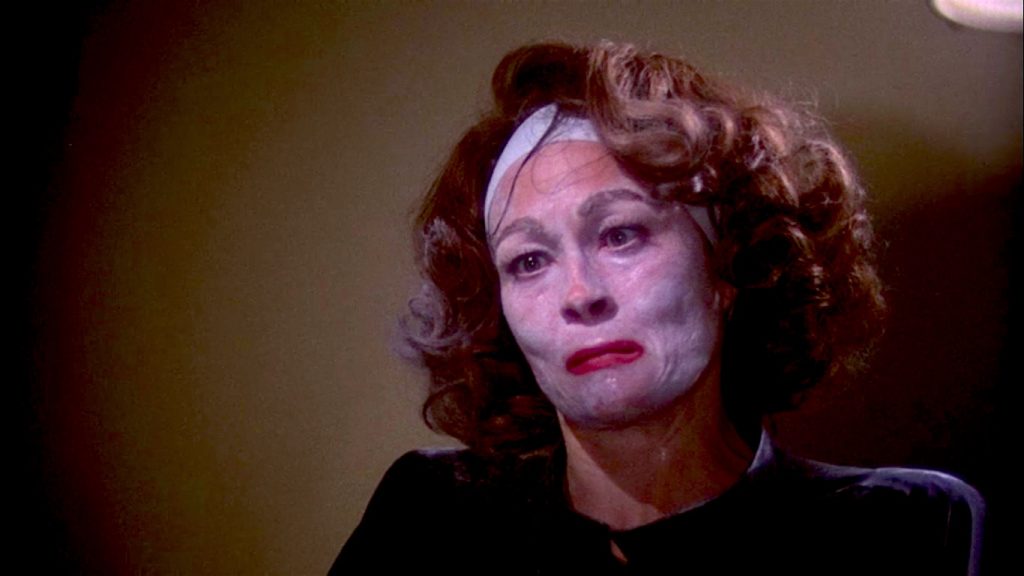
In virtually every scene Dunaway is screaming, hurling drinks, being OCD, throwing her weight around, and indulging in unhinged reactions to the tiniest infringement. At one point she even repeatedly yells: “I’m not acting! I’m not acting!”
Yes, Faye, we can see that. The question is: what the fuck are you doing?
Everything is turned up to eleven, but what makes it all so glaringly daft is she’s mainly bursting blood vessels opposite a child. This turns everything on its head, giving the impression Joan is the ultra-petulant brat and Christina the sober adult.
Weirdly, Dunaway was no amateur at this point. She couldn’t blame a lack of experience for this fiasco. Indeed, she was a hugely talented, hugely successful actress who’d starred in quality fare such as Bonnie and Clyde, Chinatown and Network, but it’s startling to witness her lack of self-awareness. Ditto the director when it came to reining in her hideous overacting. Her career was never quite the same again.
So, Faye Dunaway sits atop my list of ham. Plenty of others have jostled for her lofty position in their time.
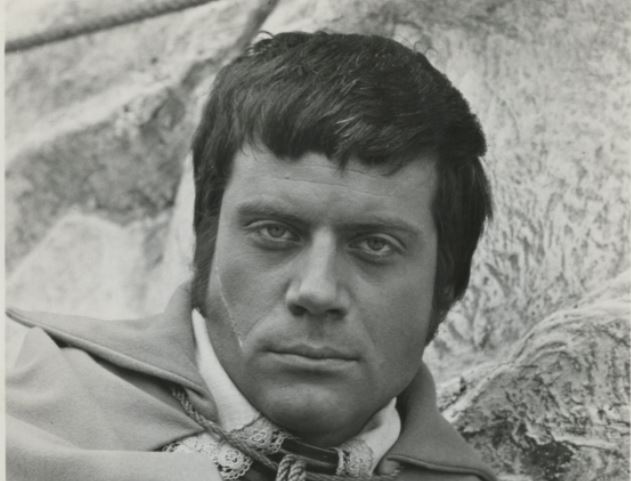
Oliver Reed in The League of Gentleman (1960)
When you think of tough, manly occupations, acting doesn’t usually spring to mind. I’m pretty sure I could’ve won a fist fight with Charles Hawtrey. I might even be able to kick Hugh Grant’s ass. However, you could never accuse a thespian like Ollie Reed of being a pansy. He was a barrel-chested, underrated actor, a proud Brit who refused to move to Hollywood at the height of his early 70s fame. Despite some decent roles, such as the sexually magnetic priest in The Devils and the fading, betrayed strongman in Gladiator, he became increasingly famous for his boozing, brawling and off-screen behavior, especially when his alcohol-soaked career nosedived into the toilet. This was a Rolls Royce-destroying, trouser-dropping, unreconstructed hellraiser who (according to the quietly sad doco The Real Oliver Reed) once drank 104 pints in 48 hours.
At his 56-bedroom home he drunkenly challenged fellow drinkers to dangerous duels with broadswords or obliterated kitchen clocks with shotgun blasts. He created havoc on and off film sets. Very few women (at least in the early days) could resist his astonishing good looks. He remained a man’s man, free of pretension and bullshit, until his burning the candle at both ends lifestyle resulted in a predictably early demise in 1999. For most of his life the charismatic bastard carried a dark sexual charge and genuine air of burly threat, the sort of danger that most of today’s actors couldn’t even dream of.
So, it’s a bit of a surprise to witness his speaking debut in the well-regarded but overlong British crime caper, The League of Gentleman. No animalistic brute here, folks. Instead, we get an outrageous, eye-opening cameo in which he plays a shrewish nancy boy at a theater being told he’s got the wrong room as he looks to rehearse Babes in the Woods. With a hand on a hip and a drawn-out charming, he flounces off in a minor whirlwind of lisping, eye-rolling and dedicated mincing. He’s so much of a queen that he should be wearing a tiara.
I guess we all have to start somewhere.
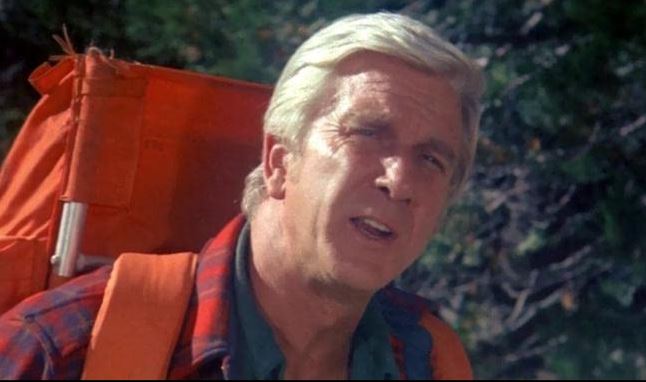
Leslie Nielsen in Day of the Animals (1977)
I can remember going to the cinema in 1988 to see the quite amusing The Naked Gun. This was probably my introduction to Leslie Nielsen or at least the one that stuck in my head. From Naked Gun onward I grew used to seeing the guy star in one bad parody after another (Repossessed, Spy Hard, Dracula: Dead and Loving It), a parasitical approach that saw originality drain away and cake on the floor.
So he did comedy. He deadpanned. His films were ridiculous damp squibs that rarely made any money.
But at least he had a recognizable onscreen persona.
It was only later in the day I realized he didn’t start off with all this piss-taking. In fact, during the first half of his career he avoided comedy, spoof and slapstick like the plague. Until 1980’s Airplane! he played things straight for twenty-five years, such as his po-faced turn as the doomed captain in the megahit The Poseidon Adventure. Occasionally, however, he did nasty, an approach exemplified by his batshit mad performance in Day of the Animals. This is an enjoyably nutso eco-horror movie that features the wondrous sight of him bare-chested and foaming-at-the-mouth while wrestling a grizzly bear in a thunderstorm.
I shit you not.
He plays Paul Jenson and it’s pretty easy to describe his character: he’s an obnoxious prick. Well, he does work in advertising. Even so, he still puts in a terrific amount of effort annoying the other outdoor-loving, inappropriately dressed characters during a two-week holiday hike down a Californian mountain. There’s his racism, often referring to the Indian guide as Kemosabi while making limp jokes about reservations and medicine men. “You’re an Indian,” he tells the guy at one point. “That’s nothing to be ashamed of.”
Thanks for the insight, Mr. Jenson.
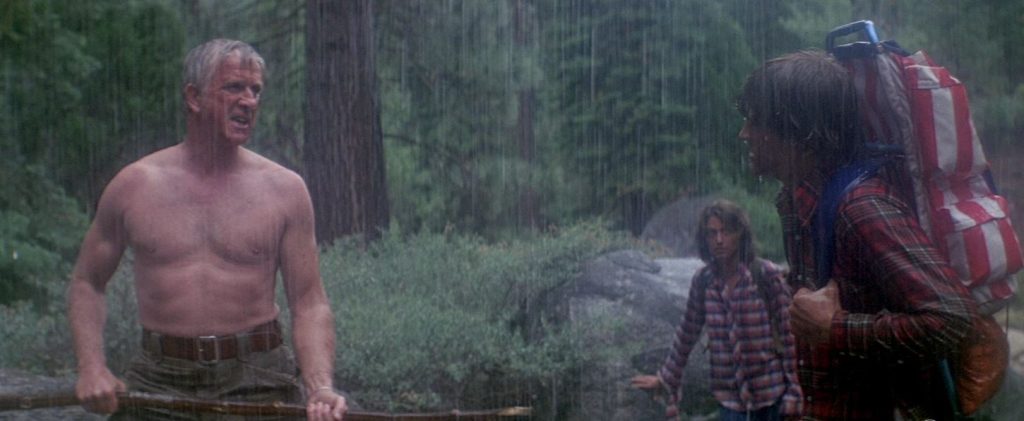
However, he spits out most of his contempt at the group’s leader, Steve Buckner (Christopher George). Increasingly vocal about the man’s perceived lack of competence, whether it be reading a map, finding food or protecting them from a range of increasingly savage animal attacks, Jenson sarcastically calls him ‘hotshot’ to his face twelve times. Saying that, some of his relentless criticism does seem justified in that Buckner has failed to bring along a two-way radio or any form of weapon. These are Americans and, as such, I expect them to be armed to the teeth when going to the bathroom, let alone tramping around outdoors surrounded by coyotes and wolves.
Anyhow, it doesn’t take Jenson long to turn mutinous, leading a splinter group back up the mountain toward a ranger station. Ten minutes later he’s gone stark raving mad, a sea change that pushes an already deeply absurd, unintentionally funny movie into the realm of camp.
At this point I should tell you that during Animals’ opening we’re informed the reason for nature striking back is the damaged ozone layer. It’s letting in too much ultraviolet light and ‘adversely affecting all living things.’ This environmental catastrophe explains Jenson’s sharp left turn into bonkersville. Fine, but why is no one else affected? Or is it just chopsy advertising execs that are particularly susceptible to a strong dose of UV?
Whatever the case, we know something’s up when we find Jenson hiking along topless. Now it’s starting to rain and he’s attacking vegetation with his trusty walking stick, threatening to throw a ‘cockroach’ child off a cliff and fighting the boy’s protective mother. Christ, he seems to think he’s helming a WW2 death march.
“You lily-livered punk,” he snarls at one bloke objecting to his unorthodox leadership style as the rain pours down his enraged face, “I’m running this camping trip! I take what I want and I give you what I wanna give you. And right now, I want that.”
That? What’s he ranting about? Oh, I see. The man’s wife. Leslie Nielsen is gonna have a go at rape. This is… unexpected, a bit like switching on an Arnie pic to find the big guy pirouetting across the screen in a pink tutu. Meanwhile, Jenson has seized his intended victim. “Come on, baby,” he reassures her, “you’re gonna have a real man.”
Unsurprisingly, this tantalizing promise does not cause the hubby to stop objecting. Seconds later their marriage is over, given that Jenson has just impaled him on the end of his stick. Shirley, you can’t be serious? Now Jenson’s bellowing at the lightning-crisscrossed sky. “My Father, who art in heaven, you made a jackass out of me for years. It’s never been you for me. Melville’s God, that’s the God I believe in. You see what you want, you take it!” Time to have another go at rape. Hang on, a grizzly bear is intervening, obviously in a divine attempt to save the woman’s blushes. Who says there’s no God?
“Bastard,” Jenson says as he wearily gets up and staggers toward the great shaggy beast.
Now that’s what you call a fitting final word.

Gary Oldman in Leon: The Professional (1994)
Leon has about as much credibility as a drunken, pregnant nun in a brothel. It’s a take-your-brain-out thriller, demonstrating all the inherent flaws and lapses in logic that I have come to expect from director Luc Besson (see 2014’s Lucy, not so much a take-your-brain-out thriller as a take-your-brain-out thriller and stamp-it-to-mush while marveling at the shining, rampant idiocy of one of the dumbest movies in existence).
Leon may not reach Lucy’s loopy heights, but it is a consistent head shaker. It’s full of incompetent, panicky, badly dressed gangsters/cops who don’t have a shred of poise between them, all outwitted by a mentally subnormal, illiterate, milk-drinking hit man who appears to be part spider, part gymnast.
Now this might sound like I’m not a fan of Leon, but I’ve always argued the worst thing a movie can be is dull. Leon is never dull. It barely contains one iota of believability, but it sure is entertaining bollocks and I wouldn’t have a problem with anyone loving its farcical, high-octane nature.
Its main absurdity rests on the shoulders of bent, drug-fuelled DEA agent Norman Stansfield (Oldman). How this bug-eyed guy has become an agent, let alone be allowed to continue when he’s obviously as homicidally demented as Idi Amin is anyone’s guess. Harvey Keitel’s Bad Lieutenant pushed things pretty bloody far, but at least that fucked-up nutter was operating within some framework of masturbating plausibility.
Not our unshaven, tieless Stan.
He doesn’t interview suspects in a bid to find the truth, he sniffs them. He takes drugs on the job, although he’s such an exhibitionist he can’t even swallow them discreetly. Instead he does this overcomplicated thing in which an overhead camera watches him throw back his head, wrench it to the side and pull a tortured face like he’s about to transform into a werewolf. And why not? Why not pretend he’s a werewolf cop who doesn’t recognize the laws of man while in the grip of one of his less amiable moods? That would be as good an explanation as any for his wildly OTT, tic-saturated behavior.
After all, this is a man who launches a full-blooded assault with his equally corrupt crew on a strangely deserted apartment block in the middle of New York City. Now we’re used to the likes of Dirty Harry bending and even breaking the rules, but Stan finds it impossible to follow any recognized legal procedure in his professional life. He murders women left, right and center. Not that he’s content to merely shoot them in the bath or blow holes in their back with a pump-action shotgun. Oh, no. He has to pretend he’s listening to Beethoven at the same time, waving his arms like a conductor.
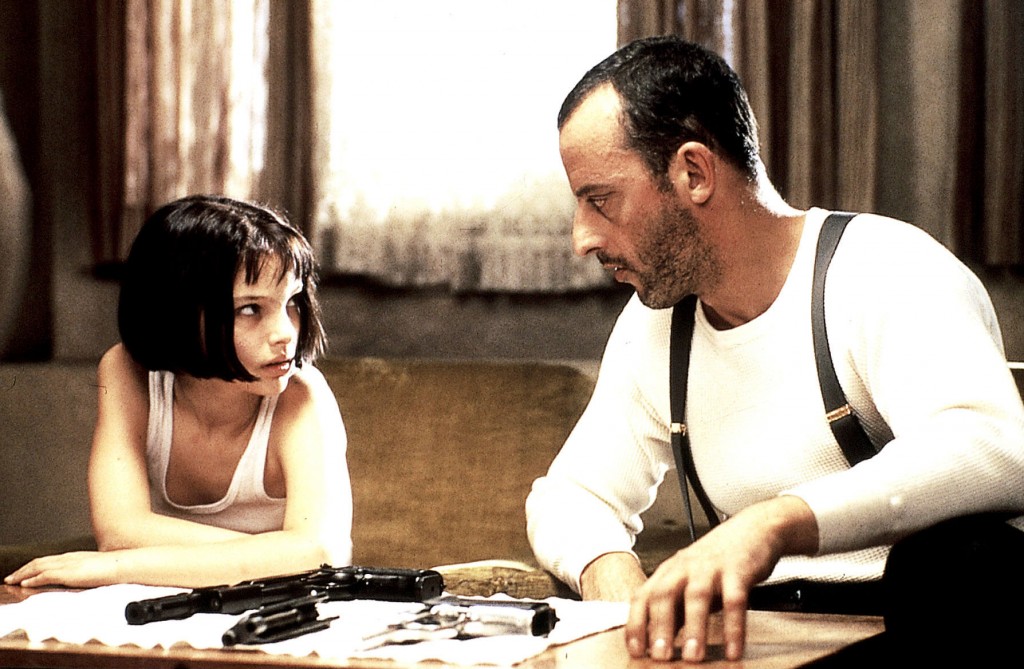
He even keeps trying to kill you after you’re dead.
When a bespectacled old dear wanders into the hallway to query what’s going on, he loosens off a round at her, shattering a glass partition. No other tenants or passersby bother showing the slightest curiosity. It’s like this raid is going down on a different planet, one that looks like Earth, but where it’s actually not that unusual to slaughter a family in broad daylight. Ten minutes later we hear the wail of police sirens. Stan leaves behind a dreadlocked subordinate, who understandably questions what he’s gonna say when the cops find a bloodbath in which unarmed women have been shot in the back. “Tell them we were doing our job,” Stan replies.
All this to get their naughty hands on a solitary bag of coke?
During the subsequent inquiry, Stan is taken back to the murder scene to have a go at an explanation but is flippant, dismissive and once again, obviously mad. You don’t have to be a shrink to see that his theatrical sighs, exaggerated face rubs and blank stares mark him out as a raving loon. And how the hell is he still on the job? Don’t civilian-annihilating offenders get time off, needing to be cleared of wrongdoing before they can strap on a gun again? “I haven’t got time for this Mickey Mouse bullshit!” he shouts at one investigator. Five people dead, including a cop and a toddler, and he’s carrying on like they’re pulling him off an important case for a parking ticket misdemeanor.
Did I say Dunaway put in the hammiest performances of all time? Maybe I need to rethink.
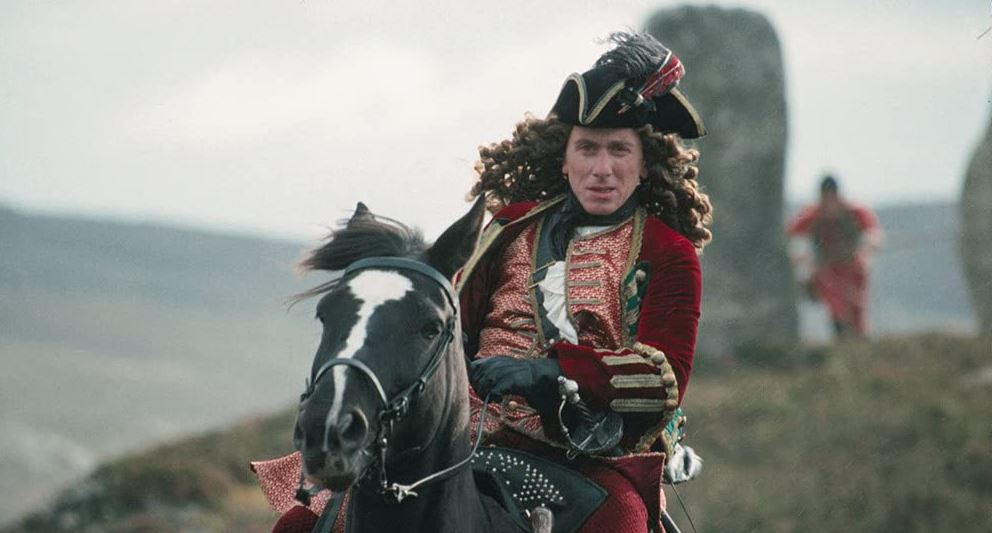
Tim Roth in Rob Roy (1995)
With a feather-adorned hat, shoulder-length curly wig, cravat, powdered makeup and effete manner, the English aristocrat Archibald Cunningham (Roth) is your archetypal dandy. A committed fop. An 18th century New Romantic who looks like he might break into a lengthy rendition of Girls on Film at any second.
Nothing scary about him, then?
Hmm, I think this is what they call misdirection.
Turns out this showoff is an expert swordsman, murderous rapist and total badass, although he prefers his poofter act to lull opponents into a false sense of security. It amuses him, you see. Take his duel early on with a gruff Scottish bastard. The man’s got terrible hair, terrible teeth and probably couldn’t even spell fashion let alone practice it, but at least he’s a proper man. The bookie’s favorite, too. Archie, meanwhile, is mincing around as the crowd jeers his every self-affected move and theatrical intake of breath.
Well, who do you think is gonna win?
Roth’s florid take on the character in this mediocre, overlong period piece grows wearisome after a couple of minutes. Yes, he has his moments dealing with the ladies (“Think of yourself as the scabbard and me the sword, Mistress MacGregor, and a fine fit you were, too” and “Love is a dunghill, Betty, and I am but a cock that climbs upon it to crow”) but overall his attempted encapsulation of limp-wristed Evil is way too much. The mock deference, the insincere expressions, the simpering, the over-articulate speech, the little flourishes in stark contrast to his rank callousness and abundant savagery… Fucking hell, give me Jake the Muss any day.